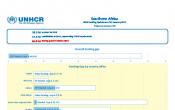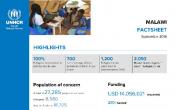Malawi
Operation: Malawi
Location
{"longitude":34,"latitude":-13,"zoom_level":0}
Latest update of camps and office locations 21 Nov 2016. By clicking on the icons on the map, additional information is displayed.
Key Figures
| 2018 planning figures | |
| 4 | educational infrastructure will be improved; and 60 teachers will be recruited: 30% of primary school children, 60% of secondary school children, and 60% of tertiary school students are not enrolled in schools |
| 400 | people of concern per water tap: current figures show between 500 to 700 people per water tap surpassing the standard of 150 per water tap |
| 15% | of current laws are consistent with international standards relating to refugees: Reservations to the International Law, improve refugee status determination and protection standards refugee law and policy to be enhanced through advocacy, training and capacity development |
| 10% | of people of concern with access to adequate shelter: Decongestion of Dzaleka camp to meet safety standards. PoCs targeted to receive long-term/permanent shelter when relocated |
| 2% | of people of concern (18-59 years old) will be supported to own businesses or become self-employed for more than 12 months |
| 2016 end-year results | |
| 30,260 | people of concern received shelter support in Dzaleka and Luwani camps |
| 30,000 | people of concern and 40,000 people in host communities were provided with primary health services |
| 7,190 | refugee and asylum-seeker children were enrolled in primary education in Dzaleka and Luwani camps |
| 1,200 | people of concern had their cases submitted for resettlement |
Latest Updates
Last Updated 11 May 2016
People of Concern
29%
Increase in
2016
2016
| 2016 | 30,415 |
| 2015 | 23,489 |
| 2014 | 20,373 |

[["Refugees",9392],["Asylum-seekers",21023]]
Loading ...
Malawi
< Back
2016
{"categories":[2013,2014,2015,2016,2017,2018],"budget":[4.43871604,4.41194171,6.24625509,14.05602103,18.11807959,17.399751598],"expenditure":[2.73036648,2.94750217,3.7456183,5.68901108,null,null]}
{"categories":[2013,2014,2015,2016,2017,2018],"p1":[4.43871604,4.41194171,5.71283409,14.05602103,18.11807959,17.399751598],"p2":[null,null,null,null,null,null],"p3":[null,null,null,null,null,null],"p4":[null,null,0.533421,null,null,null]}
{"categories":[2013,2014,2015,2016,2017,2018],"p1":[2.73036648,2.94750217,3.26069035,5.68901108,null,null],"p2":[null,null,null,null,null,null],"p3":[null,null,null,null,null,null],"p4":[null,null,0.48492795,null,null,null]}
Loading ...
CHOOSE A YEAR
- 2015
- 2016
- 2017
- 2018
Year-end Overview
Plan Overview
Working environment
Malawi has enjoyed a stable and democratic government since the end of the one party regime in 1993. The process leading to the elections in 2019 is expected to be peaceful. However, Malawi faces high living costs and breakdowns in the provision of essential social services. Malawi is also facing challenges due to floods and droughts impacting food security. The population of concern to UNHCR has increased from close to 17,000 in 2013 to over 31,000 in August 2017. The number of new asylum-seekers, particularly from the Democratic Republic of Congo, is expected to increase during 2018.
The Government has supported with land and some personnel. The operation has developed a number of partnerships with private sector, civil society, national/international NGOs, local institutions and government bodies.
Key priorities
In 2018, UNHCR will focus on:
- Ensuring access to quality education through enhancing the capacity of teachers and provision of learning materials;
- Facilitating the voluntary return of Mozambican asylum-seekers during 2018;
- Decongestion of Dzaleka camp including phased relocation of people of concern to suitable settlement sites identified by the government.





